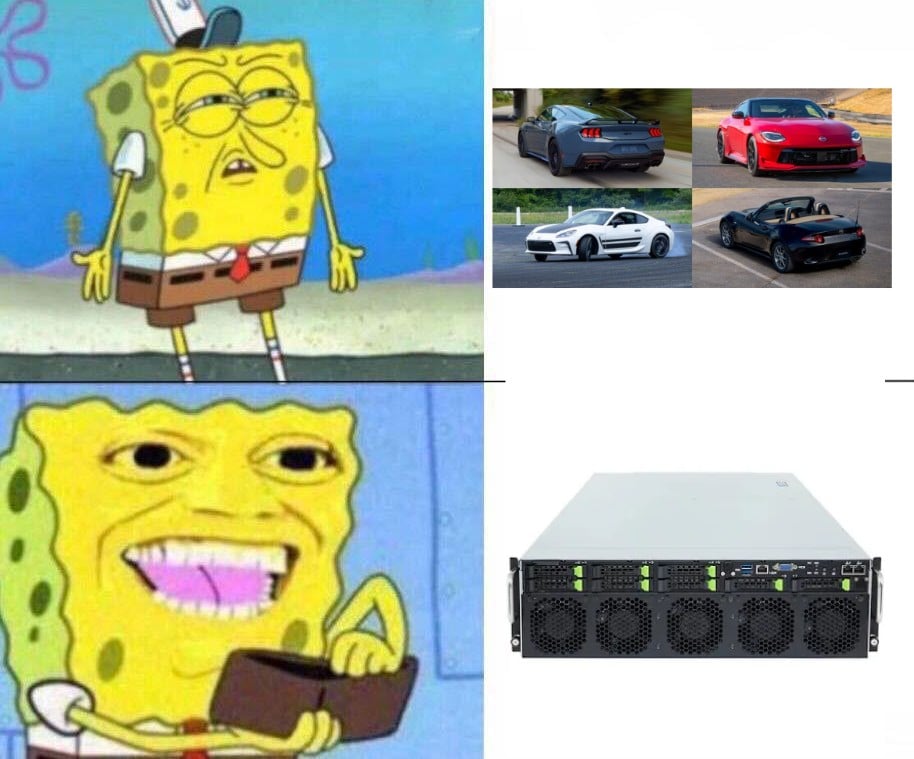this post was submitted on 14 Nov 2024
587 points (98.5% liked)
memes
13069 readers
3763 users here now
Community rules
1. Be civil
No trolling, bigotry or other insulting / annoying behaviour
2. No politics
This is non-politics community. For political memes please go to !politicalmemes@lemmy.world
3. No recent reposts
Check for reposts when posting a meme, you can only repost after 1 month
4. No bots
No bots without the express approval of the mods or the admins
5. No Spam/Ads
No advertisements or spam. This is an instance rule and the only way to live.
A collection of some classic Lemmy memes for your enjoyment
Sister communities
- !tenforward@lemmy.world : Star Trek memes, chat and shitposts
- !lemmyshitpost@lemmy.world : Lemmy Shitposts, anything and everything goes.
- !linuxmemes@lemmy.world : Linux themed memes
- !comicstrips@lemmy.world : for those who love comic stories.
founded 2 years ago
MODERATORS
you are viewing a single comment's thread
view the rest of the comments
view the rest of the comments

Yeah, I've been there - it's how I learned to upgrade and eventually assemble my own PCs: I couldn't just buy a new one every time it started to run slow with newer games so I learned which parts gave the better bang for the bug (back in those days it was often memory) and would upgrade them and eventually hit another bottleneck and upgrade that part and so on, and once in a while I did need to to a big upgrade (i.e. the motherboard, which usually meant also new CPU and new memory).
I was also pretty lost - at least to begin with - back then, but, you know, doing is learning.
Anyways, I still keep the "no waste" habits from back then (for example, recently I upgraded my CPU with one which the benchmarks say is twice as powerful, only my CPU is from 2018 and I didn't want to upgrade the motherboard so the replacement had to be a CPU for the same socket type, so something also from that time. Ended up getting a server class CPU for it, which back then was over €200 but now, 2nd hand, cost me just €17).
Over time have learned to prioritize other things also and learned that sometimes spending a bit more upfront saves a lot more over time (for example, if I aim for stuff that produces less heat (i.e. that use less power to do its work, which in todays technical lingo is "lower TDP") and I might spend a bit more but save it all and then some in lower electricity costs over time.
Point being that with a bit of reading and looking around you can learn what you need to better chose what you get, even if 2nd hand, in such a way that the results are less of a hassle and sometimes even end up saving more money (such as how parts that use a lot of power even 2nd hand can, in year or two, add up to something more expensive than newer parts which consume less because the 2nd hand ones eat so much more power).
Also as one gets more financially able to afford it, it's normal to trade personal time savings for money, in the sense that I don't really need to have a fragile setup held together with chewing gum and string which is constantly giving me problems and I have to waste tons of time on it just to keep it going, when at least for some things I can get a ton of extra convenience and save a lot of my time by spending a little bit more money. There is a monetary value for one not to have to worry about something breaking all the time and having to constantly tweak and maintain it, you just have to find how much is it worth it for you (I can tell you peace of mind and no-hassle It's worth a lot more for me nowadays than back when I was a teen).